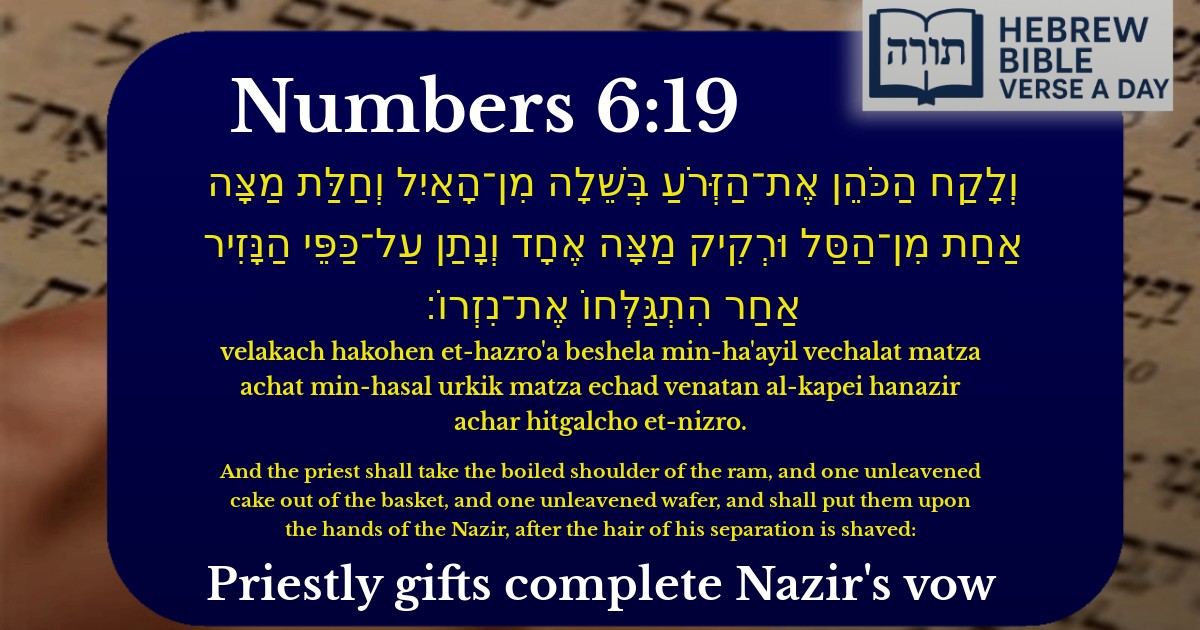Join Our Newsletter To Be Informed When New Videos Are Posted
Join the thousands of fellow Studends who rely on our videos to learn how to read the bible in Hebrew for free!
Hebrew Text
וְלָקַח הַכֹּהֵן אֶת־הַזְּרֹעַ בְּשֵׁלָה מִן־הָאַיִל וְחַלַּת מַצָּה אַחַת מִן־הַסַּל וּרְקִיק מַצָּה אֶחָד וְנָתַן עַל־כַּפֵּי הַנָּזִיר אַחַר הִתְגַּלְּחוֹ אֶת־נִזְרוֹ׃
English Translation
And the priest shall take the boiled shoulder of the ram, and one unleavened cake out of the basket, and one unleavened wafer, and shall put them upon the hands of the Nazir, after the hair of his separation is shaved:
Transliteration
Velakach hakohen et-hazro'a beshela min-ha'ayil vechalat matza achat min-hasal urkik matza echad venatan al-kapei hanazir achar hitgalcho et-nizro.
Hebrew Leining Text
וְלָקַ֨ח הַכֹּהֵ֜ן אֶת־הַזְּרֹ֣עַ בְּשֵׁלָה֮ מִן־הָאַ֒יִל֒ וְֽחַלַּ֨ת מַצָּ֤ה אַחַת֙ מִן־הַסַּ֔ל וּרְקִ֥יק מַצָּ֖ה אֶחָ֑ד וְנָתַן֙ עַל־כַּפֵּ֣י הַנָּזִ֔יר אַחַ֖ר הִֽתְגַּלְּח֥וֹ אֶת־נִזְרֽוֹ׃
וְלָקַ֨ח הַכֹּהֵ֜ן אֶת־הַזְּרֹ֣עַ בְּשֵׁלָה֮ מִן־הָאַ֒יִל֒ וְֽחַלַּ֨ת מַצָּ֤ה אַחַת֙ מִן־הַסַּ֔ל וּרְקִ֥יק מַצָּ֖ה אֶחָ֑ד וְנָתַן֙ עַל־כַּפֵּ֣י הַנָּזִ֔יר אַחַ֖ר הִֽתְגַּלְּח֥וֹ אֶת־נִזְרֽוֹ׃
🎵 Listen to leining
Parasha Commentary
📚 Talmud Citations
This verse is quoted in the Talmud.
📖 Nazir 47a
The verse is discussed in the context of the rituals performed for a Nazirite after the completion of their vow, particularly the offerings and the shaving of the hair.


The Nazir's Offerings After Completion of Vow
The verse (Bamidbar 6:19) describes the final stage of the Nazir's purification process, where the Kohen places specific portions of the ram sacrifice and matzah offerings upon the Nazir's hands. This ritual marks the completion of the Nazirite period and his return to ordinary status.
Components of the Offering
Symbolism of Placing on the Hands
The Talmud (Nazir 47b) discusses how this act of placing the offerings on the Nazir's hands serves multiple purposes:
Timing - After Shaving the Hair
As emphasized in the verse, this ritual occurs after shaving the Nazir's hair. The Kli Yakar explains this sequence teaches that: